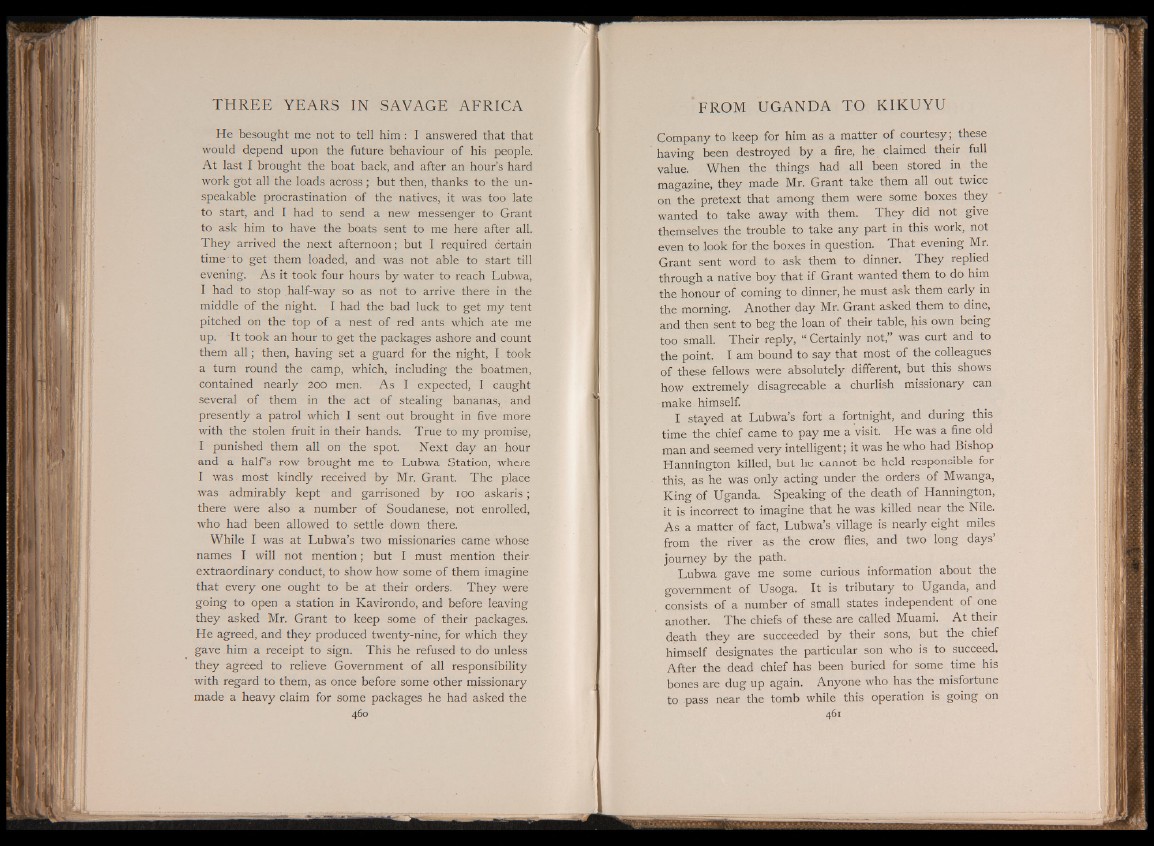
He besought me not to tell him : I answered that that
would depend upon the future behaviour of his people.
At last I brought the boat back, and after an hour’s hard
work gbt all the loads across; but then, thanks to the unspeakable
procrastination of the natives, it was too late
to start, and I had to send a new messenger to Grant
to ask him to have the boats sent to me here after all.
They arrived the next afternoon; but I required certain
time to get them loaded, and was not able to start till
evening. As it took four hours by water to reach Lubwa,
I had to stop half-way so as not to arrive there in the
middle of the night. I had the bad luck to get my tent
pitched on the top of a nest of red ants which ate me
up. It took an hour to get the packages ashore and count
them a ll; then, having set a guard for the night, I took
a turn round the camp, which, including the boatmen,
contained nearly 200 men. As I expected, I caught
several of them in the act of stealing bananas, and
presently a patrol which 1 sent out brought in five more
with the stolen fruit in their hands. True to my promise,
I punished them all on the spot. Next day an hour
and a half’s row brought me to Lubwa Station, where
I was most kindly received by Mr. Grant. The place
was admirably kept and garrisoned by 100 askaris;
there were also a number of Soudanese, not enrolled,
who had been allowed to settle down there.
While I was at Lubwa’s two missionaries came whose
names I will not mention; but I must mention their
extraordinary conduct, to show how some of them imagine
that every one ought to be at their orders. They were
going to open a station in Kavirondo, and before leaving
they asked Mr. Grant to keep some of their packages.
He agreed, and they produced twenty-nine, for which they
gave him a receipt to sign. This he refused to do unless
they agreed to relieve Government of all responsibility
with regard to them, as once before some other missionary
made a heavy claim for some packages he had asked the
460
Company to keep for him as a matter of courtesy, these
having been destroyed by a fire, he claimed their full
value. When the things had all been stored in the
magazine, they made Mr. Grant take them all out twice
on the pretext that among them were some boxes they
wanted to take away with them. They did not give
themselves the trouble to take any part in this work, not
even to look for the boxes in question. That evening Mr.
Grant sent word to ask them to dinner. They replied
through a native boy that if Grant wanted them to do him
the honour of coming to dinner, he must ask them early in
the morning. Another day Mr. Grant asked them to dine,
and then sent to beg the loan of their table, his own being
too small. Their reply, “ Certainly not,” was curt and to
the point. I am bound to say that most of the colleagues
of these fellows were absolutely different, but this shows
how extremely disagreeable a churlish missionary can
make himself.
I stayed at Lubwa’s fort a fortnight, and during this
time the chief came to pay me a visit. He was a fine old
man and seemed very intelligent; it was he who had Bishop
Hannington killed, but he cannot be held responsible for
this, as he was only acting under the orders of Mwanga,
King of Uganda. Speaking of the death of Hannington,
it is incorrect to imagine that he was killed near the Nile.
As a matter of fact, Lubwa’s. village is nearly eight miles
from the river as the crow flies, and two long days’
journey by the path.
Lubwa gave me some curious information about the
government of Usoga. It is tributary to Uganda, and
consists of a number of small states independent of one
another. The chiefs of these are called Muami. At their
death they are succeeded by their sons, but the chief
himself designates the particular son who is to succeed.
After the dead chief has been buried for some time his
bones are dug up again. Anyone who has the misfortune
to pass near the tomb while this operation is going on
461